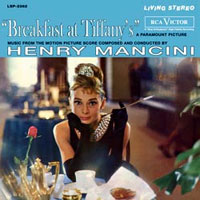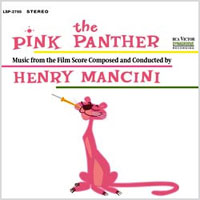Henry Mancini • Breakfast at Tiffany's
Henry Mancini • The Pink Panther
hile Henry Mancini was a prolific and lauded composer for film and television as far back as the mid-1950s, he truly made his bones and ascended to star status with his music for these two classic films. Both Breakfast at Tiffany's and The Pink Panther remain time-tested and well-loved favorites, in no small part due to Mancini's urbane, sophisticated and witty scores, which have now been re-released on LP by the estimable German label Speakers Corner. Taking these two wonderful LPs chronologically, Tiffany’s has long been known in audiophile circles for its luscious, rich sound and massively wide and deep stage. Engineered by Al Schmitt -- best known today as the engineer of Diana Krall’s recordings and much other fine jazz -- it may be just a tad dark, but glamour is very much to the forefront on my original "Black Dog" pressing from 1961. The chorus on the wistful "Moon River" floats center-left behind whipped-cream plush strings, each voice defined with individuality but without any overly etched boundaries. Ah, the magic of Golden Age tube mastering. The bold and brassy “Something for Cat” has bite and bounce, the acoustic bass well defined and solidly located. The bongos that flash across the soundfield have the unmistakable sound of flesh hitting a drumhead. The air surrounding the banjo and xylophone on "Mr. Yunioshi" is nearly breathtaking in its lifelike quality. The chorus, wordless this time, solo trumpet and trombone of "Sally’s Tomato" throw an immense soundstage that one could seemingly walk or fall into. Ensemble brass also takes the lead on "The Big Blow Out" and "Hub Caps and Tail Lights" with big dynamics, spot-on tonalities and a stage that seems miles deep I could go on, but suffice it to say that the original LP is something very special indeed and the ultimate in JFK-era cool. Speakers Corner has done this nearly magical original more than justice. Edges are a bit more crisply defined, bass has a tad more definition and there’s just a jot more air on top. Strings are not quite as lush as the original’s, but they remain very sweet. Presentation of the stage is ever so slightly more forward. While the reissue may not be quite the posh, overstuffed marshmallow that the original is, this is a lovely sounding LP. What tradeoffs there are balance out, and given the quiet of Speakers Corner pressings, may even weigh in favor of the new LP. Even the bewitching cover photo of Audrey Hepburn is nicely reproduced. There is no bad choice to be made between original and reissue here. Panther presents a clearer sonic contrast. The 1963 original was a Dynagroove record. Dynagroove was an active gain-riding process developed by the "geniuses" at RCA to compensate for perceived problems at the mastering stage. Most veteran audiophiles, including me, will argue that Dynagroove created more problems than it ever began to solve, particularly in the period immediately following its introduction, with foggy graininess and flattened dynamics being most prominent to my ears. Later Dynagrooves minimized these flaws, but they remained to some degree inherent in the process. The Pink Panther is best known, of course, for the slinky title track, one of the most memorable main themes in the history of film. Like Tiffany’s, this LP re-creates a truly massive soundstage in every direction; the percussion in "It Had Better Be Tonight" seems as though it is out in the middle of the street north of my listening room. There is air to spare, though it has a grain not present in the earlier album. Also like Tiffany’s the music is intelligent, though slightly more continental in style. The original LP is good, but it definitely suffers from some of the faults inherent to Dynagroove. The air of the soundstage does not have the crystalline clarity of Tiffany’s, and while tonal colors are vivid, they do not have quite the contrast of the earlier album. All in all, the Panther reissue is slightly but consistently superior to the original RCA, as the damage wrought by the Dynagroove process at the mastering stage has been eliminated. To give but one example, the entry of the strings on "The Village Inn" has always been quite grainy and steely on the original pressing, and this is mitigated somewhat, though not completely, by the reissue because the original mix was simply too hot. If you like Mancini’s music, either for reasons of
retro-cool or simply because it is most enjoyable in its own right, you cannot go wrong
with either of the Speakers Corner LPs. They
are beautifully made and very much worthy successors to the originals. |


